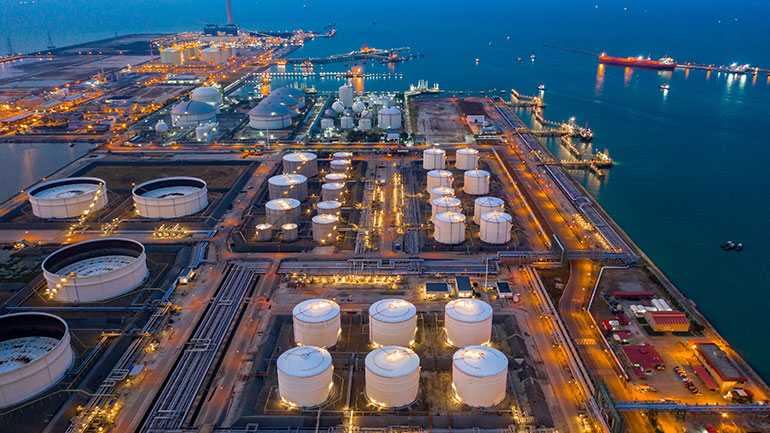Contributed by Sidney Mondin, Regional Manager, Filter Resources – an MCE Company
In the oil and gas industry, the integrity and performance of equipment are closely tied to the cleanliness of the fluids and gases that flow through them. From the wellhead to the refinery, contaminants can silently compromise components, shorten equipment lifespans, and lead to costly unplanned shutdowns. This is where filtration steps in — not just as a line of defense, but as an operational essential.
Oil and gas operations span some of the most challenging environments. High pressures, harsh chemicals, sand, saltwater, extreme temperatures, and vibrations all take a toll on systems. Add in the threat of particulate contamination — rust, dirt, metal shavings, water aerosols, hydrocarbons — and the risk to both mechanical performance and safety becomes significant.

Contaminated fluids can:
- Erode seals and valves
- Cause blockages and flow restrictions
- Lead to overheating and corrosion
- Accelerate wear of gears and bearings
- Trigger sensor errors and component failure
- Introduce hazardous substances into the process stream
In hydraulic systems alone, contamination is responsible for up to 75% of all failures. That level of impact, financial as well as safety, makes filtration not just a maintenance tool, but a proactive investment in uptime, efficiency and employee security.
Common filter types in oil & gas
Selecting the right filter depends on the fluid, expected contaminants, pressure levels, and system requirements. Below is a breakdown of some of the most widely used filters across upstream, midstream, and downstream operations.
Coalescing filters: Removes fine liquid aerosols and submicron particles from gas streams. Common in natural gas dehydration, compressor protection, and gas turbine intake systems. The benefits: High-efficiency separation of moisture and oil aerosols that could otherwise cause corrosion or performance loss in critical systems.
Activated carbon filters: Adsorb volatile organic compounds (VOCs), hydrogen sulfide (H₂S), and hydrocarbon vapors. Used in gas scrubbing and air purification in refineries and petrochemical plants. The benefits: Removes trace impurities and odors, contributing to safety, compliance, and product purity.
Particulate filters: Traps solid contaminants such as rust, sand, and debris. Installed on pipelines, hydraulic systems, and as pre-filters in multi-stage assemblies. The benefits: Prevents abrasive wear and clogs in precision machinery, reducing failure rates.
Multi-stage systems: Combines multiple filtration mechanisms (particulate, coalescing, carbon) for broader contaminant removal. Tailored for high-contamination settings like offshore platforms, fracking systems, and refinery process lines. The benefits: Modular and configurable to match exact operational conditions.
H₂S removal filters: Chemically adsorbs hydrogen sulfide and sulfur compounds from gas and liquid streams. Used for sour gas treatment, pipeline protection, refinery desulfurization units. The benefits: Minimizes corrosion, protects downstream components, and supports emissions control.
Hydraulic and pneumatic system filtration
Hydraulic systems are the backbone of oil and gas field operations, powering everything from drilling rigs to subsea controls. Maintaining fluid cleanliness is vital for avoiding seizure, scoring, and overheating. Key filter types here include:
High-pressure hydraulic filters: Built to withstand pressures exceeding 6,000 psi, these filters are crucial for protecting pumps and actuators from abrasive contaminants.
Return-line and off-line filters: Clean hydraulic fluid as it cycles through or independently circulates through a system to maintain ISO cleanliness levels.
For pneumatic systems, compressed air filters remove moisture, particulates, and oil aerosols that could otherwise rust components or lead to system failure. Clean air also supports safety standards in confined spaces and improves tool reliability.
Lubrication system filters
Oil-lubricated equipment like compressors, gearboxes, and turbines depends on clean lubricant to minimize friction and dissipate heat. Contaminants such as soot, dust, or metal particles can degrade oil quality and lead to catastrophic failure. Lubrication filters help extend oil life, lower wear rates, and keep high-value equipment in service longer.
Cartridge and inline filters
For general-purpose filtration in systems like cooling loops, fuel lines, and low-pressure process fluid circuits, cartridge filters offer an economical, easy-to-replace option. With options in pleated or depth media, they’re a mainstay for operators who need reliability without excessive cost.
Filtration is more than a reactive safeguard — it’s a strategic enabler of performance, efficiency, and compliance in oil and gas. Whether managing hydraulic power on a fracking site or purifying natural gas before pipeline transport, effective filtration extends equipment life, reduces maintenance costs and keeps operations running clean.
In today’s climate of rising equipment and maintenance costs, the question isn’t whether to invest in filtration, it’s how to do it right.

Sidney Mondin, Regional Manage at Filter Resources – an MCE Co., has years of experience helping companies identifying and solving filtration issues and inefficiencies with the most cost effective filtration solutions. MCE is a solutions provider of automation products, engineered systems, fluid power, compressed air, flow control, lubrication, and instrumentation solutions serving the industrial sector. Learn more at mceautomation.com.

Leave a Reply